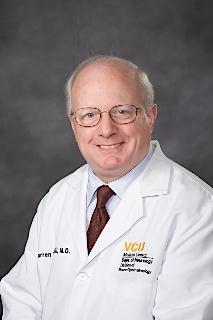May 17, 2016
VCU Comprehensive Stroke Center director offers practical ways to avoid strokes and recover from one
Share this story

Warren Felton III, M.D., medical director of the Virginia Commonwealth University Comprehensive Stroke Center, recently answered questions about stroke prevention and recovery during a VCU Health Twitter chat as part of Stroke Awareness Month.

Earlier this month, VCU Medical Center received the Gold Plus Achievement Award and was designated as a Target: Stroke Honor Roll-Elite Plus hospital for its participation in the Get With The Guidelines-Stroke® program. VCU Medical Center was the first comprehensive stroke center in Virginia.
In the U.S., nearly 800,000 people each year suffer a stroke, and stroke kills nearly 129,000 people a year. A stroke occurs every 40 seconds.
During Felton’s chat, VCU Health encouraged community members to participate in the chat by sending their questions in advance or throughout the hour as the chat occurred. Stay engaged with future VCU Health Twitter chats by following @VCUHealth and searching the hashtag #VCUHealthChat.
What is a common cause of stroke?
High blood pressure is the most common stroke risk factor. Also, bad cholesterol, diabetes, smoking, heart disease and genetics are causes.
Are there different types of stroke?
Yes. Blocked artery stroke is most common. In this instance, arteries may be blocked by a clot coming from the heart or neck arteries. Another major stroke cause is hemorrhage, due to bleeding into the brain or bleeding from a brain aneurysm.
How do I know I’m having a stroke?
Remember the acronym F.A.S.T. It stands for face, arm (or leg), speech and time. If a person experiences sudden one-sided face, arm or leg weakness or change in speech it may be the onset of a stroke.
What should I do if I think someone else is having a stroke?
Don’t delay. Call 911. The quicker patients are seen and treated, the better the outcome.
Can a stroke be treated?
Yes. Clot-busting drugs are used within four and a half hours of stroke onset. A clot retrieval device may be used within six hours or longer of stroke onset. A brain aneurysm can be repaired with mechanical devices or surgery, whether or not it ruptures and causes bleeding.
Are strokes preventable?
Yes. Controlled blood pressure, cholesterol and diabetes, as well as being active and stopping smoking help prevent strokes. Also, don’t discontinue prescribed blood pressure or other medications. What’s good for the heart is good for the brain!
Can children have a stroke?
Yes. Stroke is among the top 10 causes of death in children and young adults ages five to 19. Their symptoms are similar to symptoms experienced by an adult.
Does it make a difference which hospital I go to if I’m having a stroke?
People have better outcomes with less disability if seen at a hospital where large numbers of stroke patients are treated. With the latest advancements, comprehensive stroke centers are best equipped to care for all types of stroke patients.
Is stroke rehabilitation important?
Yes. Physical, occupational and speech therapies are key aspects of regaining function and independence after a stroke.
Subscribe for free to the weekly VCU News email newsletter at http://newsletter.news.vcu.edu/ and receive a selection of stories, videos, photos, news clips and event listings in your inbox every Thursday.
Subscribe to VCU News
Subscribe to VCU News at newsletter.vcu.edu and receive a selection of stories, videos, photos, news clips and event listings in your inbox.









